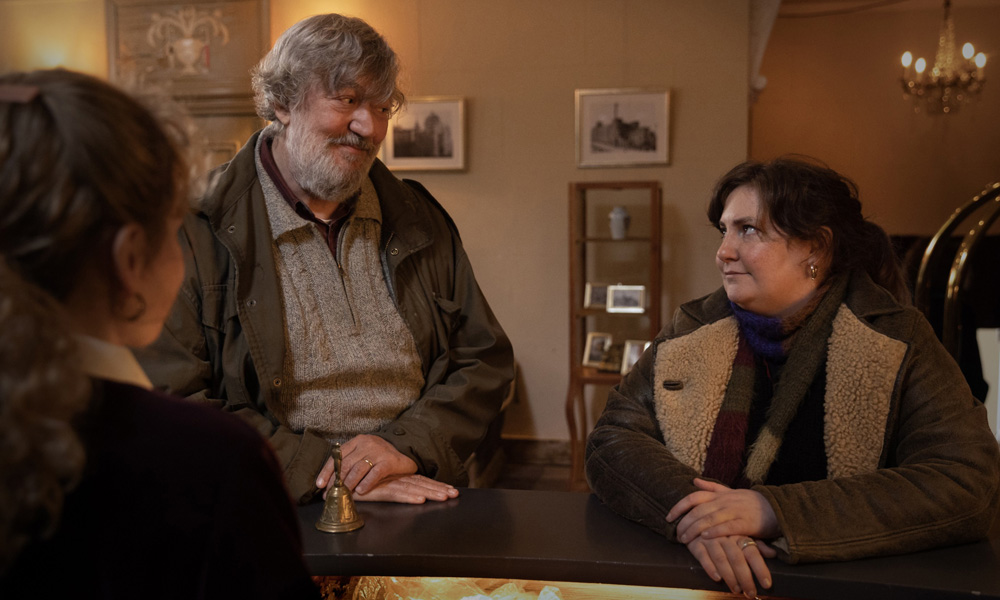It’s been well-established in “Treasure” that Edek (Stephen Fry) and Ruth (Lena Dunham) are father and daughter in conversation with a pair of fellow travelers at a hotel lounge in Krakow, but when one of the women asks “How do you know each other?” you can’t help but wonder for a split second if the question is being directed at them or to Stefan (Zbigniew Zamachowski), the local Polish driver Edek has hired to take them across the country over the weekend. It’s intended for the latter, and actually a rather compassionate gesture to change the subject after an intense exchange where Edek has become critical of how Ruth has a tendency to push away the people that love her and Ruth can’t be sure if he can include himself in that group. They may not present themselves as strangers, but they don’t seem more familiar with one another than anyone else at the table.
The odd couple pairing may itself be familiar in the latest from Julia von Heinz, but the director finds something more compelling than expected in the dynamic when it’s more than interpersonal history that’s held the two back from being closer. Loosely adapting Lily Brett’s novel “Too Many Men” with regular co-writer John Quester, von Heinz continues an interest in quantifying the insidious nature of fascism that started with her previous film “And Tomorrow the Entire World,” in which activists banded together to stop the rise of neo-Nazis in her native Germany. While “Treasure” also takes place in the present, it turns its eye towards the past when Ruth, a New York-raised journalist, decides to informally investigate her family’s roots in Poland after they fled the country following a stint inside Nazi concentration camps during the Holocaust. Edek insists on coming along for her protection, though he otherwise would have no desire to return and from the moment he stumbles into the airport in Warsaw, he looks like he’s holding her back for reasons both intentional and not.
Although Edek describes protection as keeping Ruth safe from those roaming the streets at night, it appears to be something else entirely as he pulls her from her plans to travel on a group tour and instead hires Stefan to drive them around to locations of his choosing, giving her a curated look at the country that would avoid any potential pain for her, but more so for himself when he clearly feels the past should be left there. What seems fresh about “Treasure” is that there are no great secrets that Edek wants to keep, just a general confusion around why anyone would want to revisit such misery and blind to the fact that the lack of discussion around it between himself and Ruth’s mother has created an insatiable curiosity for their daughter, who feels she’s missing something without it.
With the amiable Fry and Dunham onboard, von Heinz is able to reckon with this in a somewhat lighthearted manner, but seriously considers the broader implications of entire generations that may inadvertently carry on the hopes of the worst among them when they self-censor themselves regarding horrors they’ve experienced and the cycles of hatred continue when there’s no history to reference. “Treasure” admirably scales this idea from within the relationship between Edek and Ruth where much has been hidden or distorted out of an irrational fear of one another to larger cultural concerns, such as when the pair visits the building that once belong to Edek’s family and as the realization sets in that descendants of the family that obtained the property as a direct result of their eviction still occupy it, negotiations over what is owed to Edek and Ruth by its present day tenants is a complicated question, particularly when the evidently poor family clings onto some of their visitors’ heirlooms as a matter of their own survival now.
Where “Treasure” stumbles slightly is not in the big ideas it raises, but some of its smaller touches. Dunham, who rarely acts outside of the films she directs herself and becoming a rarer presence even there, is an inspired choice as Ruth, yet the character is unnecessarily tortured in scenes of late-night binge eating and stick tattooing when her exasperated exchanges with her father are more than enough to express her discontent. The level of her estrangement from Edek is also a bit hazy with Fry’s gregarious turn as the native Pole, who like her has arrived from New York but seems as if he’s never left the place of his birth, making both his disillusionment with it and the distance he has from her a bit murky in the early going. However, von Heinz meets the far more daunting challenge of treating the touchy subject matter with the respect it deserves and armed with a winning duo at its center, makes “Treasure” airy enough to open up the conversations that its characters have to dig so deep within themselves to have.
“Treasure” will screen again at Berlinale on February 21st at 9:30 pm at the Cineplex Titania and February 22nd at 9:45 pm at the HKW 1 – Miriam Makeba Auditorium. It will open in the U.S. on June 14th via Bleecker Street.




